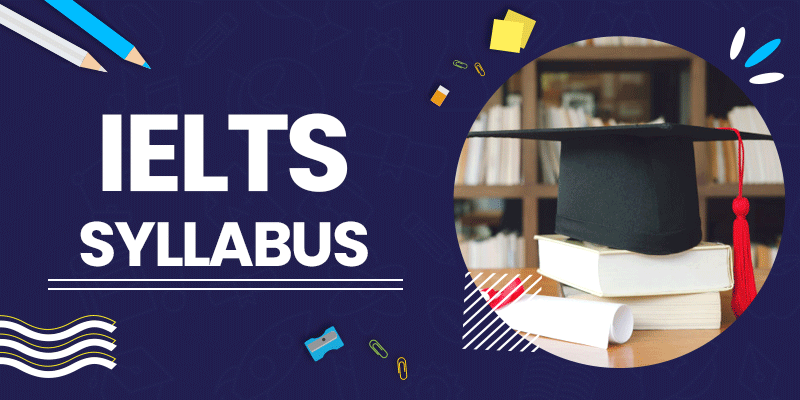Planning to Study Abroad? Register Now & Get a Call from Us.
The IELTS (International English Language Testing System) test checks all four language skills – listening, writing, reading, and speaking in the context of real-life use of English. Having a good understanding level of the English language does not assure you a good score in the IELTS. Often the more successful students are better prepared according to the IELTS syllabus and therefore provide better results. Before you dive into that, here are some useful links for you to check out:

| IELTS Exam | IELTS Exam Preparation |
| IELTS Eligibility | IELTS Exam Registration |
IELTS Syllabus
The IELTS Syllabus is determined by its administrators namely British Council, IDP, and Cambridge ESOL Examinations for both the versions ( IELTS Academic and IELTS General Training). The IELTS Syllabus contains four Components namely Speaking, Writing, Reading, and Listening. In the Listening and Speaking sections, there is the same IELTS syllabus for all applicants while the parts of reading and writing IELTS syllabus differs depending upon the General and Academic Test. From the following information, you can get more details of different sections in the IELTS syllabus.
IELTS syllabus for the Listening section
IELTS syllabus for the Listening part includes four units of increasing difficulty. Each unit includes either a speech or a dialogue which starts with a short introduction telling the applicant about the condition and the speakers. Then they have some time to look over questions. IELTS Syllabus is the same for both, Academic and General Training. It includes 4 sections of 40 items. They are as follows :
- One is a conversation between two individuals
- Second is a monologue/speech
- The third section is a conversation among a maximum of four candidates arranged in an academic setting
- The final one is a speech on an academic subject
IELTS syllabus for the reading section
IELTS syllabus for the reading part includes 3 sections, 40 items. In this, you need to read the text passages and answer questions in multiple-choice, sentence completion, summary writing, matching information, short answers. Each passage contains 13-14 questions. The reading module has in total of 40 questions. The IELTS syllabus for the reading section is different for both the versions
- Reading-IELTS syllabus for Academic training:
- The syllabus consists of 3 long texts
- The content includes the range from descriptive and factual to discursive and analytical.
- The texts are of undisputed origin and are taken from journals, books, newspapers, and magazines.
- These are selected for a non-expert audience.
- Suitable for candidates entering into university courses or looking for professional registration in an international environment.
Reading- IELTS syllabus for General Training:
- Applicants are required to read topics from books newspapers, advertisements, magazines, company handbooks, guidelines, and notices
- These are materials one is likely to come across on a daily basis in English-speaking surroundings.
IELTS syllabus for the writing section
The IELTS syllabus for the writing section is different for both versions:
- In the Academic part for writing part, the IELTS syllabus has two tasks: in Task 1 applicants define a diagram, graph, procedure, or chart, and in Task 2 they explain the information in your own words
- In the General Training section, there are also two tasks: in Task 1 applicants write a letter or explain a condition, and in Task 2 they are asked to write an essay in response.
IELTS syllabus for the speaking section
- The test will be recorded for the purpose of evaluation and will include 3 parts that simulate a face-to-face oral interview with an examiner. It takes generally 11 to 14 minutes to complete. The IELTS syllabus for the speaking test comprises three segments. They are as follows :
- The first part is taken in the form of an interview throughout which applicants may be enquired about their preferences, interests, hobbies, explanation for taking IELTS test as well as other general IELTS speaking topics such as family, clothing computers, free time, fashion, computers, etc
- In the second part, applicants are given a specific topic card on which they have to talk. They will just have one minute to prepare.
- The third part includes a conversation between the examiner and the applicant, questions are asked related to the topic which they have already spoken about in part 2. This last segment is more immaterial and is regularly measured the most difficult.
IELTS syllabus is designed in such a way to tests your ability on the basis of four skill sets which we have explained above. One must be aware of the admission process related to the IELTS of the particular institute where he or she has applied because it varies from institution to institution. However, it is suggested that keep yourself updated on the selection procedure of the college/university you are applying to. All the section is important and difficult in their way. However, as per the survey worldwide, the toughest part of IELTS is the writing part. So, now that you have known the IELTS syllabus start preparing for your test as soon as possible.
Here we have prepared a few sample papers for testing your ability
Best Countries to Study Abroad
Reach Out To Us
Register here to get newsletters for the latest study abroad news & free counselling assistance.










